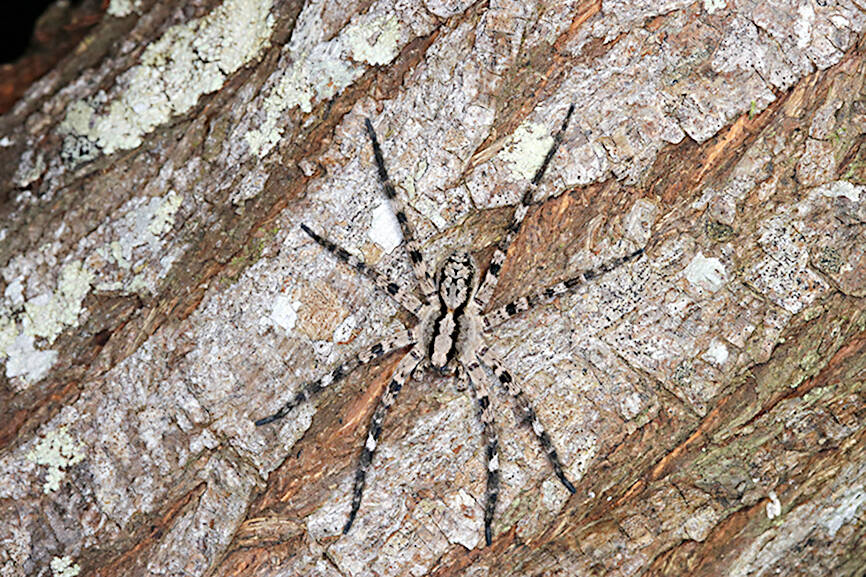Two types of spiders found in southern Taiwan’s Hengchun Peninsula have been identified as new species after years of analysis and cross-checking, the Taiwan Biodiversity Research Institute said on Thursday.
The new species are Idioctis parilarilao, also known as the parilarilao trapdoor spider, and Hogna arborea, or the Taiwanese tree-dwelling wolf spider, the institute said in a statement.
The discoveries came after years of effort by a research team consisting of personnel from the institute, National Taiwan Normal University, National Chung Hsing University and international experts, the institute said.

Photo courtesy of Lo Ying-yuan via CNA
It did not specify when the spiders were first found, but said it took years of collecting specimens, reviewing published studies and DNA time series analyses, and comparing foreign samples to confirm the Parilarilao trapdoor spiders as a new species.
Ultimately, researchers determined that parilarilao trapdoor spiders belong to the family Barychelidae, and that Taiwan is the northernmost habitat of spiders in this family.
Parilarilao trapdoor spiders build nests with trap doors and live in intertidal zones, meaning they are underwater at high tide but exposed during low tide, the institute said.
Their nests are closed by watertight trap doors to ensure that there is enough air and their homes are not flooded or washed away at high tide, and the spiders slightly open the trap doors at low tide and attack prey that go past their nests.
The new species was named after the indigenous name for the area, with parilarilao meaning “living at the end of Taiwan” in the Paiwan language, the institute said.
The other species, Hogna arborea, was determined to belong to the family Lycosidae, and according to the institute, wolf spiders in this family often dwell in grasslands, farmland or meadows.
Researchers found wolf spiders living in treeholes in recent years in several areas of eastern and southern Taiwan, including Hengchun in the south and Yilan and Hualien counties in the east, and that these spiders were later confirmed to be a new species, the institute said.
The new species was named Hogna arborea, with hogna meaning “wolf spider” and arborea meaning “living on trees,” the institute said.
According to the institute, Taiwanese tree-dwelling wolf spiders have a body size of more than 2cm and are considered large compared with most Taiwanese wolf spiders.
Taiwan has more than 20 wolf spider species, the institute said.

Taiwan is stepping up plans to create self-sufficient supply chains for combat drones and increase foreign orders from the US to counter China’s numerical superiority, a defense official said on Saturday. Commenting on condition of anonymity, the official said the nation’s armed forces are in agreement with US Admiral Samuel Paparo’s assessment that Taiwan’s military must be prepared to turn the nation’s waters into a “hellscape” for the Chinese People’s Liberation Army (PLA). Paparo, the commander of the US Indo-Pacific Command, reiterated the concept during a Congressional hearing in Washington on Wednesday. He first coined the term in a security conference last

DEFENSE: The National Security Bureau promised to expand communication and intelligence cooperation with global partners and enhance its strategic analytical skills China has not only increased military exercises and “gray zone” tactics against Taiwan this year, but also continues to recruit military personnel for espionage, the National Security Bureau (NSB) said yesterday in a report to the Legislative Yuan. The bureau submitted the report ahead of NSB Director-General Tsai Ming-yen’s (蔡明彥) appearance before the Foreign and National Defense Committee today. Last year, the Chinese People’s Liberation Army (PLA) conducted “Joint Sword-2024A and B” military exercises targeting Taiwan and carried out 40 combat readiness patrols, the bureau said. In addition, Chinese military aircraft entered Taiwan’s airspace 3,070 times last year, up about

A magnitude 4.3 earthquake struck eastern Taiwan's Hualien County at 8:31am today, according to the Central Weather Administration (CWA). The epicenter of the temblor was located in Hualien County, about 70.3 kilometers south southwest of Hualien County Hall, at a depth of 23.2km, according to the administration. There were no immediate reports of damage resulting from the quake. The earthquake's intensity, which gauges the actual effect of a temblor, was highest in Taitung County, where it measured 3 on Taiwan's 7-tier intensity scale. The quake also measured an intensity of 2 in Hualien and Nantou counties, the CWA said.

The Overseas Community Affairs Council (OCAC) yesterday announced a fundraising campaign to support survivors of the magnitude 7.7 earthquake that struck Myanmar on March 28, with two prayer events scheduled in Taipei and Taichung later this week. “While initial rescue operations have concluded [in Myanmar], many survivors are now facing increasingly difficult living conditions,” OCAC Minister Hsu Chia-ching (徐佳青) told a news conference in Taipei. The fundraising campaign, which runs through May 31, is focused on supporting the reconstruction of damaged overseas compatriot schools, assisting students from Myanmar in Taiwan, and providing essential items, such as drinking water, food and medical supplies,